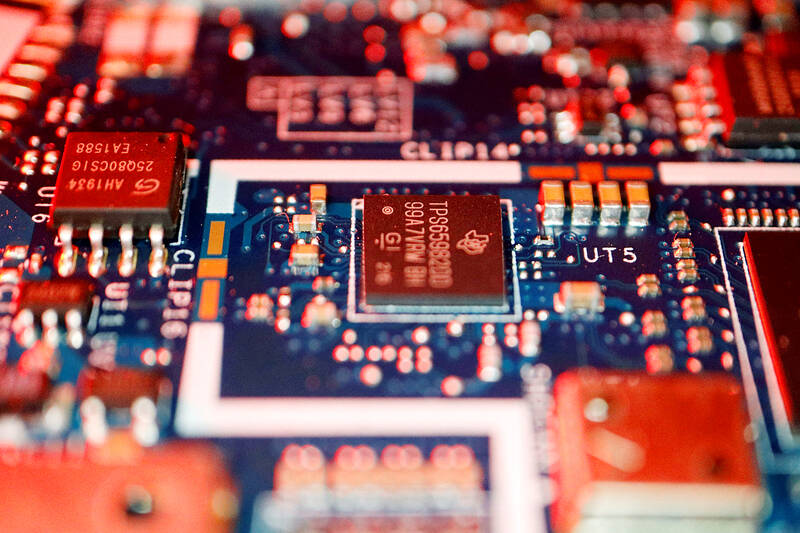The US’ imposition of controls on chip exports to China might throttle Beijing’s plan to obtain breakthrough technologies in chip manufacturing, a study by the Taiwan Industry Economic Services said.
US President Joe Biden in August signed the Creating Helpful Incentives to Produce Semiconductors (CHIPS) and Science Act, which authorizes US$52.7 billion of subsidies for US chipmakers while banning the export of chips more advanced than 28 nanometers to China for 10 years.
It also imposes export controls on technologies linked to diamond and gallium oxide semiconductors, as well as software used in the design of complex circuits and gas turbines.

Photo: REUTERS
South Korea’s Samsung Electronics Co has been hit the hardest by the restrictions, as it has been trying to secure a foothold in the US while having a significant presence in China, the research institute wrote in a study commissioned by the Mainland Affairs Council.
Samsung Electronics has since 2012 invested US$25.8 billion in China, including on manufacturing facilities in Xian which account for 42.5 percent of its NAND flash memorychip manufacturing capacity, the institute said.
Should the US ban prevent Samsung from upgrading its Xian factory, the company’s competitiveness in the memorychip market would suffer a significant setback, it said.
This development would spell trouble for China’s plans to build semiconductor supply chains and limit the potential capacity of the country’s tech industry, it added.
Washington’s efforts to target the Chinese high-tech sector have intensified with the CHIPS Act, which suggests that the trade dispute between the two countries is not likely to abate son, the institute said.
The US-led blockade and regime of surveillance on technologies would profoundly impact the chipmaking sector in China, due to the industry’s dependency on imported products and technologies, it said.
Last year, China’s semiconductor imports surged 23.6 percent to a record US$432.6 billion, indicating that a local chip shortage had reached crisis proportions, the institute said, adding that the problem appears to be worsening.
Despite recent advances in the 7 nanometer process and NAND flash memory manufacturing, China would likely struggle in dealing with the ban due to the US’ control over lithography machines, electronic design automation and crucial chip technologies, it said.
This means continuing US action could snuff out China’s efforts to acquire advanced manufacturing processes and memory chips, it said.
China has also been grappling with a worsening shortage of electronics engineers. In 2020, 210,000 people graduated from electronics engineering departments or related fields, accounting for 2.3 percent of all college graduates, the study said.
Only 13.77 percent, or about 28,000 people, of electronics graduates found work as electronics engineers, it said.
This means China has 250,000 fewer electronic engineers than it needs, further limiting the country’s means of building a national semiconductor industry, it said.
Protectionist regulations being adopted in the US and other countries increasingly prevent China from leveraging foreign acquisitions as a shortcut to foster a domestic technology sector, the study said.
Due to US pressure, companies in the EU, Japan, Singapore and South Korea are discouraged from engaging in technical cooperation with China or outsourcing to that country, a factor that further disadvantages the development of the Chinese semiconductor industry, it said.

A preclearance service to facilitate entry for people traveling to select airports in Japan would be available from Thursday next week to Feb. 25 at Taiwan Taoyuan International Airport, Taoyuan International Airport Corp (TIAC) said on Tuesday. The service was first made available to Taiwanese travelers throughout the winter vacation of 2024 and during the Lunar New Year holiday. In addition to flights to the Japanese cities of Hakodate, Asahikawa, Akita, Sendai, Niigata, Okayama, Takamatsu, Kumamoto and Kagoshima, the service would be available to travelers to Kobe and Oita. The service can be accessed by passengers of 15 flight routes operated by

Alain Robert, known as the "French Spider-Man," praised Alex Honnold as exceptionally well-prepared after the US climber completed a free solo ascent of Taipei 101 yesterday. Robert said Honnold's ascent of the 508m-tall skyscraper in just more than one-and-a-half hours without using safety ropes or equipment was a remarkable achievement. "This is my life," he said in an interview conducted in French, adding that he liked the feeling of being "on the edge of danger." The 63-year-old Frenchman climbed Taipei 101 using ropes in December 2004, taking about four hours to reach the top. On a one-to-10 scale of difficulty, Robert said Taipei 101

Taiwanese and US defense groups are collaborating to introduce deployable, semi-autonomous manufacturing systems for drones and components in a boost to the nation’s supply chain resilience. Taiwan’s G-Tech Optroelectronics Corp subsidiary GTOC and the US’ Aerkomm Inc on Friday announced an agreement with fellow US-based Firestorm Lab to adopt the latter’s xCell, a technology featuring 3D printers fitted in 6.1m container units. The systems enable aerial platforms and parts to be produced in high volumes from dispersed nodes capable of rapid redeployment, to minimize the risk of enemy strikes and to meet field requirements, they said. Firestorm chief technology officer Ian Muceus said

MORE FALL: An investigation into one of Xi’s key cronies, part of a broader ‘anti-corruption’ drive, indicates that he might have a deep distrust in the military, an expert said China’s latest military purge underscores systemic risks in its shift from collective leadership to sole rule under Chinese President Xi Jinping (習近平), and could disrupt its chain of command and military capabilities, a national security official said yesterday. If decisionmaking within the Chinese Communist Party has become “irrational” under one-man rule, the Taiwan Strait and the regional situation must be approached with extreme caution, given unforeseen risks, they added. The anonymous official made the remarks as China’s Central Military Commission Vice Chairman Zhang Youxia (張又俠) and Joint Staff Department Chief of Staff Liu Zhenli (劉振立) were reportedly being investigated for suspected “serious